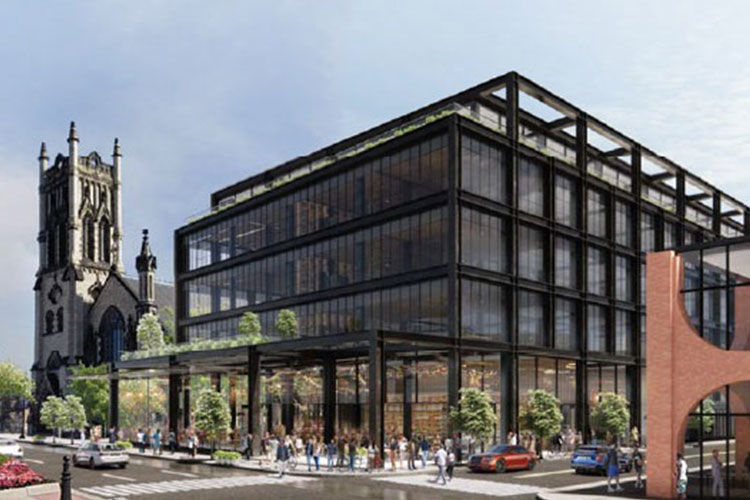The Michigan Economic Development Corp. (MEDC) announced Michigan Strategic Fund’s (MSF) has approved funding for a wide range of projects in the state.
This is part of the government’s efforts to make Michigan more business-friendly by supporting projects that develop talent and help build a future. The projects are meant to strengthen Michigan’s leadership position in future mobility and advanced manufacturing and revitalize communities across both peninsulas.
Related Cos. of New York City and Detroit-based Olympia Development of Michigan (ODM) were among the businesses that received MSF approval for their brownfield plan in The District Detroit, the 50-block area around Comerica Park, Little Caesars Arena, and Ford Field.
The project seek to create a mixed-use development that includes the rehabilitation of four buildings, three of which are historic, and construction of six mixed-use buildings in an area of Detroit anchored by Little Caesars Arena.
The development includes mixed-use buildings for retail and office spaces, residential units, and a four-story Detroit Center for Innovation Incubator, as well as the adaptive reuse and renovation of the historic Fox Office Building into a hotel. The four residential projects will include a total of 695 units, with 139 units reserved for residents with incomes at or below 50 percent of area median.
When completed, the 10 projects will link downtown, midtown, and surrounding neighborhoods with the aim of attracting leading businesses, entrepreneurs, institutions, and innovators, to the area through innovation. It is anticipated to propel job creation and inclusive economic growth in Detroit. The planned urban density and modern design of planned office and commercial space is meant to be attractive to new businesses seeking to locate and expand, making Detroit competitive for new talent and businesses.
The completed project is expected to generate a total capital investment of $1.53 billion, create 12,000 construction jobs, and when fully occupied, could result in the creation of up to 5,790 full-time jobs. MSF approved a Transformational Brownfield Plan valued at $614.9 million that authorizes several sources of tax capture in support of the project:
- State tax capture of up to $167,739,071;
- A maximum of $11,422,200 in construction period tax capture;
- A maximum of $38,114,899 construction period sales and use tax exemptions;
- A maximum of $352,361,674 in income tax capture revenues and withholding tax capture revenues (post-construction).
The city of Detroit is supporting the project through the local property tax capture portion of the Transformational Brownfield Plan, local tax abatements under the Neighborhood Enterprise Zone Act and Commercial Rehabilitation Act, as well as a Payment in Lieu of Taxes to support the 139 units of affordable housing.
The abatements given to projects, once completed, in total, are valued at approximately $133.3 million across the sites over the full term. The developer has also secured up to $25 million in financing from the city of Detroit Downtown Development Authority to support infrastructure expenses. For the first time ever, the Detroit DDA has also authorized $23.8 million in forgivable loans to fund the affordable housing components of the mixed-income developments.
The Related Cos. and Olympia Development joint venture brings a 10-building real estate development to Detroit. Related Companies’ community-building experience and history as the largest private owner and preservationist of affordable housing in the nation, combined with Olympia Development’s steady progress in The District Detroit and decades-long experience designing, building, renovating and operating dynamic multi-use venues such as the Fox Theatre, the award-winning Little Caesars Arena and Comerica Park, has enabled the two companies to identify significant opportunities for future development.
Another company receiving an MSF grant is May Mobility Inc. in Ann Arbor. The company deploys autonomous shuttles to help people get where they need to go safely and easily. The company operates in several cities across the U.S., offering transportation as a service, sold to enterprises and municipalities as a fully managed fleet of shuttles.
The company deployed autonomous vehicles in four cities across three states, all on public roads. Its shuttles move people between high-value points of interest within urban centers, filling a transportation gap between ride-hailing, scooters, and buses. May Mobility currently has 197 employees in Michigan.
The business is experiencing significant growth and plans to expand its autonomous vehicle shuttle fleet as well as its engineering and operations staff. May Mobility plans to expand at its existing location in Ann Arbor, where it will add IT equipment and expand its engineering capabilities.
The project is expected to generate a total capital investment of $18 million and create 300 high-wage jobs over the next three years, supported by a $3 million Michigan Business Development Program performance-based grant. The company chose Michigan for the project over competing sites in Boston, Silicon Valley, Pittsburgh and Tokyo, Japan because it has become an integral part of the Ann Arbor community and has developed strong relationships with the local university as well as with public and private partners.
The project is designed to build on the state’s efforts to position itself as the global leader in the future of electric vehicle manufacturing and mobility. The new positions will relate to a variety of areas including autonomy and AV platforms, product, production, and software development, with an average wage of $67.31 per hour plus benefits. The company will also continue to build out its corporate business function and executive management team.
Ann Arbor SPARK has offered to assist the company in recruiting candidates for the new positions and will continue to work with the company to find additional support for its mobility initiatives.
In August of 2020, May Mobility announced it was looking to expand all aspects of its services, including enhancements to its Autonomous Vehicle (AV) shuttle fleet, a project that will generate a total private investment of $11.8 million and create 100 high-wage engineering and tech jobs in Ann Arbor. The Michigan Strategic Fund awarded the company a $700,000 Michigan Business Development Program performance-based grant in support of the project.
In July of 2019, MEDC’s mobility initiative teamed up with May Mobility, the city of Grand Rapids, and nine Michigan companies to form the Grand Rapids Autonomous Vehicle Initiative (AVGR). The coalition brings together enterprise and infrastructure to gather and analyze critical information with the goal of understanding the usage of autonomous vehicles in a city environment. The May Mobility fleet operates complementarily to the city of Grand Rapid’s existing DASH transportation fleet.
Founded in 2010 and headquartered in Swartz Creek, LJ Inc., a family-owned advanced manufacturing company providing electrical, fabrication, automation and robot integration solutions, controls engineering, HVAC and computer service needs. The company currently has 115 employees in Michigan.
MSF grants were also approved for LJ, Inc. of Swartz Creek. The company is building a new facility in Shiawassee County where it purchased 50 acres of land in Venice Township to construct a 150,000-square-foot facility to house the manufacture of autonomous dredges. The project will result in the first dredge company in Michigan and the first autonomous dredge company in the world.
The project is expected to generate a total capital investment of $18.25 million and create 250 jobs with the support of a $2.5 million Michigan Business Development Program performance-based grant. The company chose Michigan for the project because of its established relationships with suppliers and the community.
The project is designed to bring good-paying advanced manufacturing jobs to the region. LJ provides full benefits to its employees and hires workers with challenged backgrounds, empowering them to learn new trades and providing them with on-the-job training and apprenticeship opportunities.
The Shiawassee Economic Development Partnership anticipates approval of a property tax abatement in support of the project. MEDC has also authorized a State Education Tax abatement to be used in support with the local abatement.



